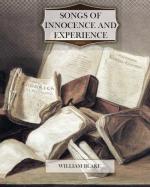|
This section contains 5,494 words (approx. 19 pages at 300 words per page) |

|
SOURCE: Hilton, Nelson. “William Blake, Songs of Innocence and of Experience.” In A Companion to Romanticism, edited by Duncan Wu, pp. 103-12. Oxford, England: Blackwell Publishers, 1998.
In the following excerpt, Hilton offers an overview of criticism of Blake's Songs.
‘Read patiently take not up this Book in an idle hour the consideration of these things is the whole duty of man & the affairs of life & death trifles sports of time these considerations business of Eternity.’ Blake's annotations to a volume he studied in 1798 (see Blake, ed. Erdman, p. 611, cited hereafter as E) can serve today to characterize the attention deserved and significance offered by the most familiar work of England's ‘last great religious poet’ (Ackroyd, Blake, p. 18) and ‘greatest revolutionary artist’ (Eagleton, in Larrissy's William Blake, p. ix).
What we know as his Songs of Innocence and of Experience begins in the publication, over the space of 35 years...
|
This section contains 5,494 words (approx. 19 pages at 300 words per page) |

|


